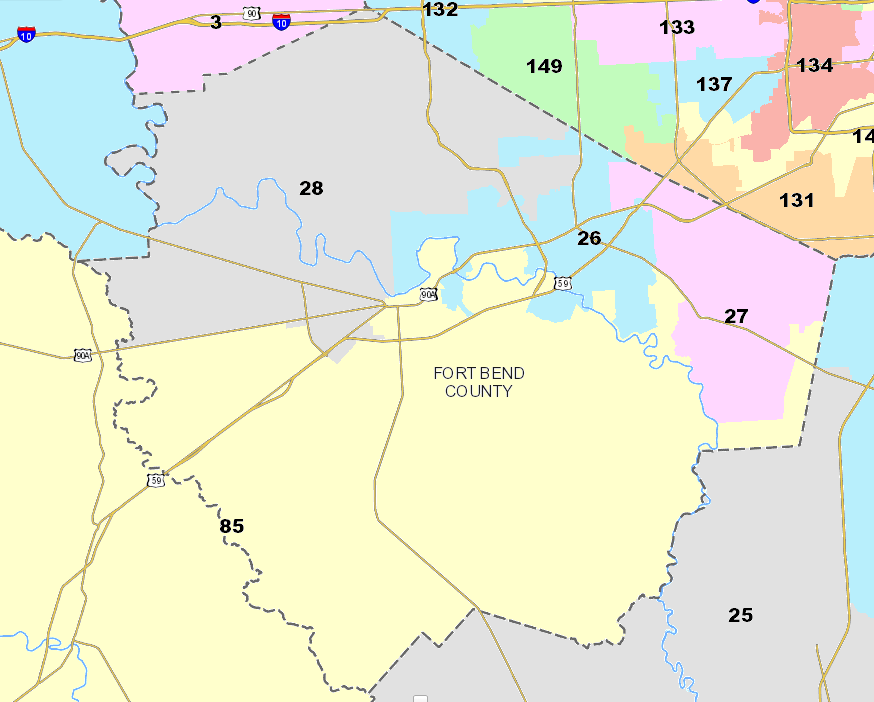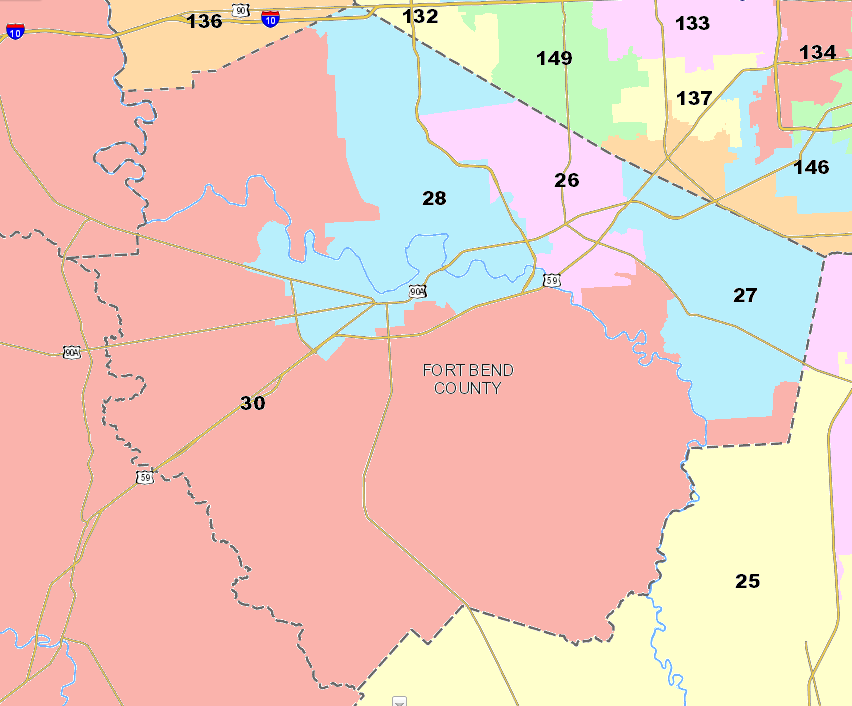TX Trib: 4 Democrats Vying to Replace Hochberg in HD-137
Observers say the winner of the contest for HD-137 is likely to be decided in the Democratic primary, whose four candidates are former Capitol staffers Joseph Carlos Madden and Jamaal Smith, Harris County prosecutor Gene Wu and Alief Independent School District board member Sarah Winkler.
“It’s a [minority-opportunity] district,” [HCDP Chair Lane] Lewis said. “People from all around the world are attracted to the district when they move to Houston. I’ve heard some people refer to it as the United Nations of Harris County.”
Only one Republican candidate, former Houston City Councilman M.J. Khan, is running for the seat. Several Democratic candidates said Khan’s name recognition could make him an opponent to be reckoned with in the general election. Khan has not filed any campaign finance reports with the Texas Ethics Commission.
Khan and the Harris County Republican Party did not return interview requests.
The Trib has done a number of stories about races like this, and they’ve done a good job of it. As they have done in other such articles, they manage to talk to all of the candidates and actually tell you something about them. It’s the mention of Republican candidate Khan that piqued my interest. As the story notes, he could be a formidable candidate in this Democratic-leaning but not rock solid district; in addition to the other factors cited, Khan could write his own check for the race and easily outspend whichever Dem wins the nomination. Yet so far at least he’s been completely disengaged. Maybe he’s just biding his time on the not-unreasonable theory that no one is really paying any attention right now, but I can’t escape the feeling that being a state legislator is not something MJ Khan has a burning desire to do. I understood his candidacy for City Controller – for sure, if he has it in his head to be Mayor some day, that’s a good way to go about it – but I never got the impression that state issues were a driving force for him. I could be wrong, and if someone out there knows better I’d love to hear from you, but I get kind of a Joe Agris 2008 vibe from him.
TX Trib: Two SBOE Rivals Each Facing Tough Primaries
Two influential incumbents on the State Board of Education — who are often at odds with each other — are both facing primary challenges that could result in a power shift on the fractious board.
Thomas Ratliff won a spot on the board after a 402-vote victory in the 2010 GOP primary over Don McLeroy, who brought international attention to the state with his spirited defense of creationism. Ratliff, a Mount Pleasant native who campaigned on a platform of taking politics out of education, has become one of the Republican-controlled board’s reliably moderate voices.
He has also been a thorn in the side of David Bradley, widely considered the ringleader of the strictly allied social conservatives who led the board to adopt science standards that required educators to teach “all sides” of evolution in 2009 and pushed for ideologically driven revisions to social studies standards in 2010.
During their time on the board, the two have been on opposing sides of issues like withdrawing money from the $25 billion Permanent School Fund to bridge the state-funding gap for public schools, requiring amendments to curriculum to be laid out at least 24 hours before a vote, and handing more authority to school districts for textbook purchases.
Now they both find themselves entangled in what are likely the board’s two most closely watched primary races.
Another Trib story, which I see as being what that lame Chron story should have been. It’s also a reminder that while the potential is there for the SBOE to become less crazy if the likes of Bradley and Cargill get defenestrated, the potential is also there for the pendulum to swing back hard towards Wackytown if Ratliff loses. TFN Insider has a handy list of the candidates to watch out for. It’s a bit unnerving to have to rely on the sanity of GOP primary voters, but for the SBOE there’s not much choice.
TX Observer: House District 26 – As Fort Bend Goes
Fort Bend has been called a bellwether county so often that it’s easy to become skeptical about the use of the term—even if the description is accurate.
Fort Bend, which sits just southwest of Houston, is among the most diverse and fast-growing counties in Texas, part of the “Big Five” fast-growing suburban counties along with Collin, Montgomery, Denton and Williamson. It has pleasant subdivisions with genteel names like First Colony and Sugar Creek and an abundance of retail outlets along Highway 6, which barrels through Sugar Land, the heart of state House District 26.
After 16 years, Republican incumbent Charlie Howard is leaving the legislative seat once held by Tom DeLay, long before he became U.S. House majority leader. Four Republicans, including two women of color, are running for the open seat.
[…]
Democrats hope to claim the county through building coalitions among its United Nations assembly of residents. Republicans are also courting the melting pot. Of the four competitors for the District 26 seat, the people of color are—Sonal Bhuchar, a trustee and former board president of the Fort Bend Independent School District, and Jacquie Chaumette, mayor pro tem of Sugar Land. Bhuchar is originally from India. Chaumette is from St. Croix, the U.S. Virgin Islands. The other candidates are Rick Miller, former chairman of the Republican Party of Fort Bend County, and Diana Miller (no relation to Rick Miller), a real estate agent.
Bhuchar and Chaumette have big fundraising hauls and are considered strong contenders in the four-way race. [County GOP Chair Mike] Gibson, not surprisingly, downplays the candidates’ race. “We don’t look at Sonal as South East Asian or Jacquie as Caribbean, but as Americans with strong skill sets that we feel good about running as Republicans,’’ he says.
One thing this article doesn’t talk about is the fact that HD26 is one of the disputed districts in the ongoing redistricting litigation. Plaintiffs claim that districts such as HD26 are protected under the Voting Rights Act as minority coalition districts. In that fashion, a district that is more than 50% minority cannot be retrogressed even if no single racial group has more than a plurality of the population. The state argues that only districts in which a single protected minority is 50% or more does the VRA apply and as such there is no such thing as a protected coalition district; mapmakers are free to slice and dice as they see fit. That was how the Lege treated HD26, which is why it has that bizarre mutant Tetris piece shape, which it retained in the current interim map and which allows it to be a solid red 65% GOP district. In the original interim map, the judges drew a much more compact district that was also near partisan parity – both President Obama and Supreme Court candidate Sam Houston scored a bit over 48% in it. This is one of the questions that the DC court will address in the preclearance lawsuit, whether districts like HD26, SD10, CD25, and CD33 are covered by Section 5. If they rule for the plaintiffs, and if SCOTUS doesn’t come along behind them and gut the VRA, we could see a very different HD26 in two years’ time.



Pingback: July finance reports for area State House candidates – Off the Kuff